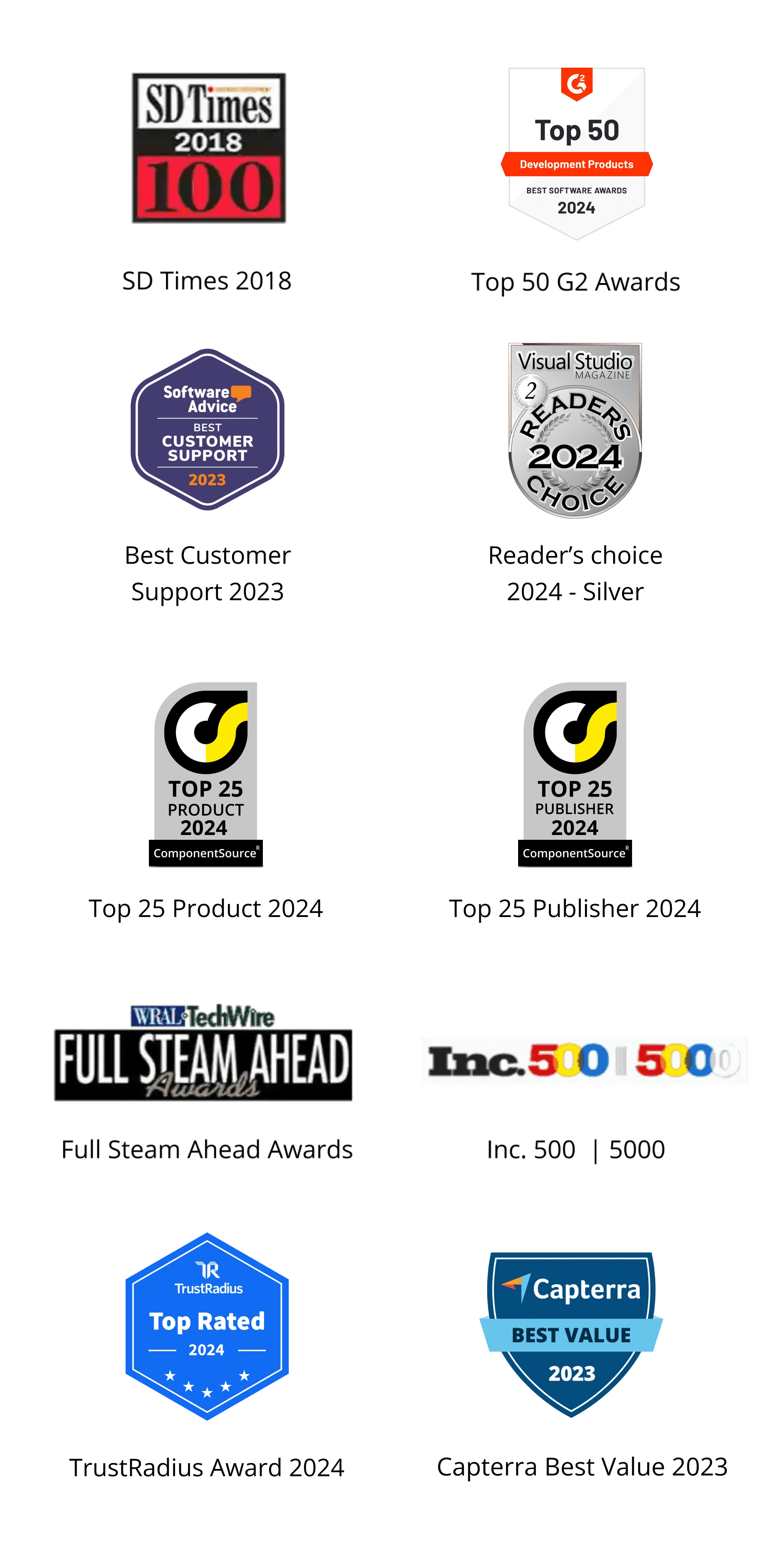Trusted by the world’s leading companies

Overview
The ASP.NET MVC Button is a custom HTML5 button control. It has several built-in features such as support for icons, predefined styles, different button types, different button sizes, and UI customization. Toggle and repeat button functionality can be achieved by handling a click event.
Icon button
Users tend to perceive visual information more readily than text. To this end, an icon button has been designed to include an icon to the right or left of the button text or provide an icon-only button.
Action or link button
The ASP.NET MVC Button control can be used to visually represent a hyperlink with both an icon and text.
Outline button
The button can be styled with a border and a transparent background.
Predefined styles
Several predefined styles of button are available:
- Primary
- Success
- Info
- Warning
- Danger
- Link
You can use them based on the context of your application.
Toggle button
The ASP.NET MVC button can be used as a toggle button to trigger two different actions based on its two states: pressed and released.

Repeat button
You can extend this button to act as a repeat button, which performs the click event repeatedly when it is clicked and held.

Disable button
The ASP.NET MVC disabled button is used to indicate the inactive state of a button. It can be enabled or disabled by using the disabled property.

Button size
You can choose from different button sizes, default and small, as required in your application.
UI customization
You can choose from built-in button types such as outline, block, and round buttons. Also, you can customize the button’s appearance.
Built-in themes
The ASP.NET MVC Button control supports built-in themes such as Bootstrap 5, Tailwind CSS, Fluent, high contrast, and more. Users can customize these built-in themes or create new themes to achieve the desired look and feel either by simply overriding SASS variables or using the Theme Studio application.
Other supported frameworks
The Button component is also available in Blazor, React, Angular, JavaScript and Vue frameworks. Check out the different Button platforms from the links below,
Web accessibility
- Fully supports WAI-ARIA accessibility practices to work with screen readers and assistive devices.
- Follows WAI-ARIA best practices for implementing keyboard interaction.
- Based on WCAG 2.0 standards, we designed the UI element visuals such as foreground color, background color, line spacing, text, and images.
- Supports right-to-left (RTL) text direction for users working in right-to-left languages like Hebrew, Arabic, or Persian.
ASP.NET MVC Button Code Example
Easily get started with the ASP.NET MVC Button using a few simple lines of C# code example as demonstrated below. Also explore our ASP.NET MVC Button Example that shows you how to render and configure a Button in ASP.NET MVC.
@using Syncfusion.EJ2
@section ControlsSection{
<div id='button-control'>
<div className="col-xs-6 col-sm-6 col-lg-6 col-md-6">
<div className="col-xs-12 col-sm-12 col-lg-6 col-md-6">
@Html.EJS().Button("primarybtn").Content("Primary").IsPrimary(true).Render()
</div>
<div className="col-xs-12 col-sm-12 col-lg-6 col-md-6">
@Html.EJS().Button("normalbtn").Content("Normal").Render()
</div>
</div>
</div>using System;
using System.Collections.Generic;
using System.Linq;
using System.Web;
using System.Web.Mvc;
namespace EJ2MVCSampleBrowser.Controllers.Button
{
public partial class ButtonController : Controller
{
public ActionResult DefaultFunctionalities()
{
return View();
}
}
}#button-control .col-xs-12 {
margin: 15px 0;
}
#button-control {
text-align: center;
}Not sure how to create your first ASP.NET MVC Button? Our documentation can help.
I’d love to read it now140+ ASP.NET MVC UI CONTROLS
Frequently Asked Questions
Why should you choose Syncfusion ASP.NET MVC Button?
Syncfusion ASP.NET MVC Button provides the following features:
- Customizable buttons with icon support to visually represent button actions.
- Built-in support for success, warning, info, and danger button styles.
Different types of buttons like outline, primary, link, and toggle.
Simple configuration and API.
- Supports all modern browsers.
- Touch-friendly and responsive UI.
- One of the best ASP.NET MVC Buttons in the market that offers feature-rich UI to interact with the software.
Extensive demos and documentation to learn quickly and get started with ASP.NET MVC Button.
Where can I find the Syncfusion ASP.NET MVC Button demo?
You can find our ASP.NET MVC Button demo here.
Can I download and utilize the Syncfusion ASP.NET MVC Button for free?
No, this is a commercial product and requires a paid license. However, a free community license is also available for companies and individuals whose organizations have less than $1 million USD in annual gross revenue, 5 or fewer developers, and 10 or fewer total employees.
How do I get started with Syncfusion ASP.NET MVC Button?
A good place to start would be our comprehensive getting started documentation.
Our Customers Love Us


 Documentation
Documentation
Awards
Greatness—it’s one thing to say you have it, but it means more when others recognize it. Syncfusion® is proud to hold the following industry awards.














